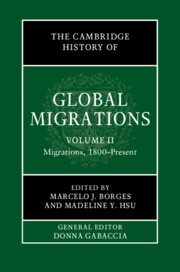Book contents
- The Cambridge History of Global Migrations
- The Cambridge History of Global Migrations
- The Cambridge History of Global Migrations
- Copyright page
- Contents
- Figures
- Maps
- Tables
- General Editor Acknowledgments
- Volume 2 Acknowledgments
- Notes on Contributors to Volume 2
- General Introduction
- Introduction to Volume 2
- 1 Multiscalar Approaches and Transcultural Societal Studies
- Part I Problematizing Freedom and Mobility
- Part II Empires, New Nations, and Mobilities
- Part III Specialized Migrations and Commercial Diasporas
- Part IV Circulations of Laborers
- Part V Transnational Politics and International Solidarities
- Part VI Displaced Peoples and Refugees
- Part VII Migrant Communities, Cultures, and Networks
- Part VIII Migration Control, Discipline, and Regulation
- Part IX Technologies of Migration and Communication
- Index to Volume 2
- References
Part III - Specialized Migrations and Commercial Diasporas
Published online by Cambridge University Press: 12 May 2023
- The Cambridge History of Global Migrations
- The Cambridge History of Global Migrations
- The Cambridge History of Global Migrations
- Copyright page
- Contents
- Figures
- Maps
- Tables
- General Editor Acknowledgments
- Volume 2 Acknowledgments
- Notes on Contributors to Volume 2
- General Introduction
- Introduction to Volume 2
- 1 Multiscalar Approaches and Transcultural Societal Studies
- Part I Problematizing Freedom and Mobility
- Part II Empires, New Nations, and Mobilities
- Part III Specialized Migrations and Commercial Diasporas
- Part IV Circulations of Laborers
- Part V Transnational Politics and International Solidarities
- Part VI Displaced Peoples and Refugees
- Part VII Migrant Communities, Cultures, and Networks
- Part VIII Migration Control, Discipline, and Regulation
- Part IX Technologies of Migration and Communication
- Index to Volume 2
- References
Summary

- Type
- Chapter
- Information
- The Cambridge History of Global Migrations , pp. 199 - 258Publisher: Cambridge University PressPrint publication year: 2023



